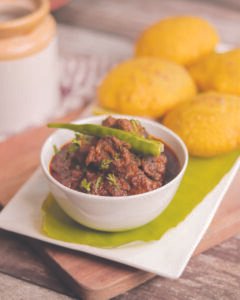
Kokum Curry Panaji serves a unique journey through generations, where tradition meets nostalgia, and every bite tells a story
Nestled in the heart of Panaji, Kokum Curry stands as a culinary gem widely recognised among Goans, particularly those with a deep appreciation for authentic and traditional cuisine. Conceived as a passion project by Sapna Sardessai in collaboration with Prakash Pereira of the Armacar Group, the restaurant is a dedicated proponent of traditional Goan Saraswat food, a culinary genre that was once confined to the kitchens of Saraswat families and has now transitioned to grandmother’s recipes.
Functioning as a bridge between the past and the present, Kokum Curry holds onto the essence of nostalgia. With a commitment to preserving the vanishing cuisine of the Saraswats, the restaurant not only serves heritage food but also acts as a culinary time capsule, allowing guests to savour the distinctive flavours of Gaud Saraswat Brahmin cuisine while creating new memories to be treasured in the years to come. This cuisine originated from the Konkan region on the western coast of India and is mainly pesco-vegetarian.

Committed to authenticity, Kokum Curry meticulously sources local produce and organically grown fruits, vegetables and spices. The key ingredients include local coconuts and coconut oil, along with kokum, tamarind and hog plums that are employed as souring agents. Notably, the use of Shankar Chhap Hing (a brand of asafoetida), teflam (Sichuan pepper), and other specific ingredients add a unique touch, shining a spotlight on the restaurant’s distinctive culinary identity. Kokum Curry steadfastly adheres to heritage recipes, offering a genuine taste of ancestral cuisine. The dishes presented are not mere reinterpretations but authentic recreations of cooking methods adopted and passed down through generations, mirroring the very gut of Saraswat households.
Additionally, the menu at Kokum Curry evolves with the seasons, incorporating the bounty of nature, such as during the jackfruit season, when a variety of dishes and desserts featuring the fruit are introduced.
The overarching concept behind the restaurant revolves around the notion of reliving the past through food. Kokum Curry aims to immerse customers in a nostalgic experience with every bite, one that facilitates connections and creates a wholesome, shared experience, particularly between grandparents and grandchildren. Sapna Sardessai emphasises this sentiment, stating, “All the items on our menu have nostalgia value. When you eat them, you invariably relate to somebody in your family, an elderly person who used to make it for you at a cherished point in time.”
Further, the restaurant’s dedication to fostering connections is reflected in its design. Long, spaced out tables encourage families to come together, share a meal, and enjoy quality time while the interior, adorned with soothing hues of green against the brown of exposed laterite, and a high tiled roof creates a nature-inspired ambience, providing a tranquil and relaxing setting.
Sapna Sardessai reveals that Kokum Curry did not rely on a conventional strategic marketing plan. Instead, its reputation grew organically, propelled by genuine enthusiasm and positive feedback from satisfied customers. Word-of-mouth became the primary driver of Kokum Curry’s success, with guests singing praises about their delightful experiences at the restaurant.
While there was no premeditated marketing strategy in place, a unique approach took shape naturally. Sardessai, an avid social media user, would often share glimpses of her life online. As such, pictures of customers thoroughly enjoying their meals at Kokum Curry became a regular feature on her social media. What started as a personal expression of capturing the joy on customers’ faces transformed into an inadvertent advertising strategy.
The act of getting one’s picture clicked at the restaurant soon became a sought-after experience. This unintentional marketing strategy not only captured the crux of the dining experience but also turned customers into the restaurant’s very own ambassadors, contributing to the restaurant’s popularity.

“Kokum Curry’s venture into Panaji marks the establishment’s second branch, following a successful two-year journey in Candolim. It was an easy move though I initially thought it would be more challenging, being amongst the giants in the restaurant business. I soon realised that there is abundant space for everyone in the trade to flourish. We were definitely not in the game to compete with another, but our own selves. We are serving a genre of cuisine that is sophisticated and unique, and I guess we have found our niche”, says Sardessai.
Beyond its culinary offerings, Kokum Curry actively engages in community initiatives, especially during various festivals.
As Christmas approaches, the restaurant has rolled out a thoughtful program featuring meal coupons, especially for the underprivileged, with the intention of allowing them to experience the authentic essence of Kokum Curry. Activities and gifts for children and the elderly further enrich the festive experience.
Hence, Kokum Curry transcends the conventional role of a restaurant, aspiring to be more than just a place that serves good food.
The establishment seeks to evoke and witness genuine emotions with every meal it dishes out, and to see connections strengthen with each visit. The desire to foster meaningful connections and facilitate the creation of lasting memories among its guests stays at the core of Kokum Curry’s mission.





